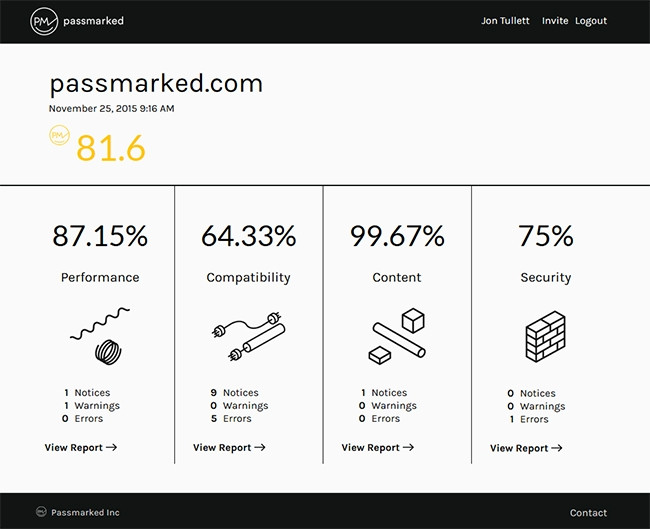
How do your Web pages measure up to others? Are they as secure, and as standards-compliant? These are the questions that Passmarked, a Cape Town-based start-up, is aiming to answer.
Passmarked evaluates a Web page against a broad set of coding, security and performance standards, then assigns it a score out of 100 as well as offering detailed advice on how to remedy each identified shortcoming.
It is the brainchild of Barry Botha and Johann du Toit. Botha, the founder of IO, a digital agency in Cape Town, was frustrated by the complexities of testing Web pages against multiple benchmarks, and set out to build one with Du Toit, his co-founder and lead technologist.
"There are existing tests, like the ACID CSS tests and W3C's compliance tests, but nothing that brought them all together, and nothing that consolidated them all into a single score."
There are also vendor-specific tools from the likes of Google, but they tend to be heavily focused on search optimisation or other limited metrics, he says.
Passmarked is still in beta, and open by invitation only, but should be commercially operational in three months. Botha says the company, now two years in the making, is in the final stages of an initial round of US-based funding.
The immediate focus for the company is on establishing contact with developer communities, to encourage widespread adoption of Passmarked. Botha hopes it will become a de facto standard for Web page quality.
"I don't have a specific exit strategy in mind," Botha says, "but I'd love to sell Passmarked to Google, and have it integrated into their developer tools and PageRank."
The goal is not only to help developers improve individual sites and pages, but also to establish a community index which reflects the current state of the art across the Internet as a whole, to show how a page compares to others.
Passmarked is currently spidering the Web, and has around 27 million pages tested with an average score of 72.78, Botha said. In the future, developers may be able to drill down to see averages by country or industry sector to identify comparable performance in a peer-group.
"It takes about three seconds to test a page," Botha says. "We've optimised heavily - it took much longer in our first iterations."
The Passmarked service runs in Google's Compute Engine cloud - building such a product in-house and scaling it to evaluate the entire Web would have been prohibitively expensive, Botha says.
An interesting wrinkle is that as standards evolve, new security threats are found, and coding practices improve, the benchmark will raise and a given static page's score will trend downwards over time, Botha observes.
Passmarked will provide site owners with a way to track those shifting goalposts and take action when page scores start to degrade. The service's API will also allow integration into the development process, so that page scores can be tested before new changes are deployed.
Passmarked's code and basic features will be open source when it launches, with paid commercial features like tracking page scores over time and API access for developers.
The tests are strict: at the time of writing, passmarked.com itself scores 81.6. "We'll try to get it to 100 by the time we launch!" Botha says.

Share